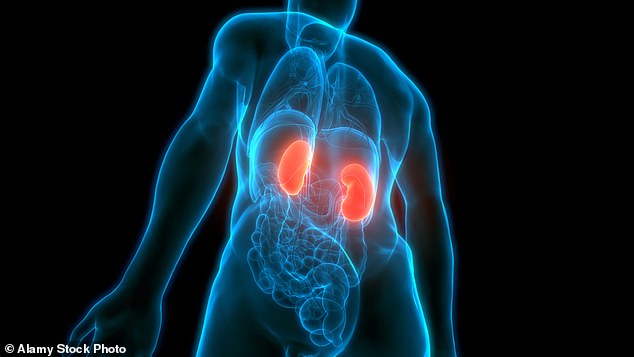Screening for kidney disease at age 45 could save thousands of people from fatal heart disease, experts claim
Testing at age 45 for early signs of kidney disease could save hundreds of thousands of people from fatal heart disease, experts warn.
A study shows that offering a blood test for the condition to all patients with diabetes and hypertension could prevent almost 170,000 heart attacks and 109,000 strokes over the next decade.
People with these conditions have an increased risk of kidney disease, which is closely linked to heart disease. But thousands are diagnosed too late to benefit from new treatments. Now one of the study’s authors has called on the NHS to extend screening for kidney disease to all adults.
“We believe that screening for kidney disease can change the trajectory of the disease for many patients, helping them avoid serious consequences such as heart attacks and strokes,” said Dr. Navdeep Tangri, a nephrologist at the University of Manitoba, Canada. ‘Screening at age 45 would work best because that is the age at which the disease starts to emerge.’
Chronic kidney disease occurs when the kidneys – which remove waste products from the blood and produce urine – stop working as they should (stock image)

The new study, presented yesterday at the European Renal Association Congress, modeled the impact of using a urine and a blood test to monitor newly diagnosed diabetes and high blood pressure patients for signs of kidney disease (stock image)
The study comes days after a landmark study concluded that the weight-loss drug known as Ozempic or Wegovy can significantly slow the progression of kidney disease and reduce the risk of heart disease.
Experts say the drug, which contains the active ingredient semaglutide, will be a new addition to a growing selection of treatments that can slow kidney disease.
Until about a decade ago, there were no medications to stop its progression, which meant that most patients would eventually need the time-consuming blood cleansing treatment of dialysis or a kidney transplant.
“Before 2014, we had no drugs for this disease,” says Dr. Tangri. ‘So there was little point in diagnosing it early. However, we are now firmly in the age of drugs for chronic kidney disease. It now makes sense to talk about screening.’
Chronic kidney disease occurs when the kidneys – which remove waste products from the blood and produce urine – stop working as they should. It usually gets worse over time and the damage cannot be reversed.
The condition affects around 7.2 million Brits, but is expected to increase by 400,000 over the next decade, driven by rising numbers with high blood pressure and obesity. Because there are often no early symptoms, many will not be diagnosed until symptoms have become severe and dialysis may be needed. But The Mail on Sunday shows that 40 percent of people with high blood pressure and diabetes are not offered a simple urine test by their GP, which can detect kidney problems early.
The new study, presented yesterday at the European Renal Association Congress, modeled the impact of using a urine and blood test to monitor newly diagnosed diabetes and high blood pressure patients for signs of kidney disease.
Researchers then predicted the impact of giving people diagnosed with kidney damage effective drugs, including empagliflozin and dapagliflozin, which have been shown to reduce the risk of progression and death by almost a third.

Experts say the drug, which contains the active ingredient semaglutide, will be a new addition to a growing selection of treatments that can slow kidney disease (stock image)

Experts say the findings open the possibility of testing the broader population – including otherwise healthy people (stock image)
The study, funded by British pharmaceutical company AstraZeneca, concluded that this measure could save the NHS £2.7 billion over the next decade, mainly by avoiding the high costs of dialysis and kidney transplants.
Experts say the findings open the possibility of testing the broader population – including otherwise healthy people.
“To me, screening for kidney disease is a bull’s-eye,” says Dr. Tangri. “The next step is to talk about universal screening of everyone over a certain age, whether it’s 40, 45 or 50.”
Fiona Loud, policy director at Kidney Care UK, said the NHS must first speed up the diagnosis of high-risk patients.
“It is clear that those most at risk for kidney disease are not being tested in a timely manner,” she said.
‘Population research is a fascinating idea, because age is one of the biggest risk factors.
‘But we must ensure that those who are most at risk of becoming seriously ill are arrested earlier.’
